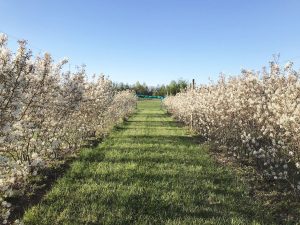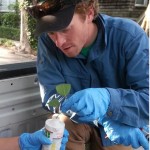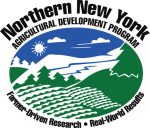
Willsboro, New York; September 7, 2023. The farmer-driven Northern New York Agricultural Development Program (NNYADP) has announced that the first occurrence of spongy moth caterpillar and berry-picking birds have influenced its research at the “superfruits’ nursery at the Willsboro Research Farm. Farm Manager Michael H. Davis, Ph.D., is developing best management practices against these pests for the nursery’s juneberry, honeyberry, aronia, and elderberry. The term “superfruit” is used to describe high-antioxidant, high-value fruits.
The first outbreak of spongy moth caterpillar in the fruit trials at the research nursery occurred in 2022. Davis noted, “Spongy moth caterpillar tends to occur cyclically about every 10 to 15 years. With each successive year of this research, we are building a comprehensive, field-tested database on such production factors as susceptibility to impact by pests, disease, and weather events; flowering and fruiting dates; fruit size and quality; and best management practices for year-to-year conditions.”

Davis and State University of New York at Plattsburgh Botanist and Assistant Professor of Biology Michael B. Burgess, Ph.D., initiated the NNYADP superfruits research. Using wild cuttings from several states and commercial fruiting and ornamental varieties collected in 2013 and 2014, they established New York State’s first and only juneberry nursery.
In 2022, the spongy moth caterpillar defoliated the nursery’s eleven commercial and nine wild varieties of juneberry. The plants produced new leaves but did not fruit. The four ornamental juneberry varieties were not damaged and flowered profusely.
Spongy moth caterpillar did some damage to the NNYADP trial’s four-year-old aronia trial but did not defoliated the plants. Damage by rose chafers and Japanese beetles plus the caterpillar’s impact in 2022 and dry growing conditions the year before may all have influenced unproductive fruiting by the aronia in 2022.
Blue honeyberry plants, added to the NNYADP “superfruits” research plan in 2018, have not yet grown to full maturity. None of the twenty varieties of blue honeyberry experienced spongy moth caterpillar damage in 2022; however, a tear in netting covering the planting allowed cedar waxwings to negate the opportunity for fruiting.

Spongy moth caterpillar did not harm the five American and two European varieties of elderberry that were added to the NNYADP trial in 2020. Davis pointed out that more than 95 percent of elderberries in the U.S. are imported, indicating a substantial domestic production market opportunity for American growers.
“Our elderberry plants are too young for any notable fruit production. They represent a significant future opportunity to ‘grow’ into the domestic market,” Davis said.
The results of the current NNYADP superfruits research year will be posted at www.nnyagdev.org in early 2024.
 The New York State Legislature established the Northern New York Agricultural Development Program in recognition of the agricultural potential of the northernmost region of the state. Funding for the NNYADP is supported by the New York State Legislature through the New York State Assembly and is administrated by the New York State Department of Agriculture and Markets.
The New York State Legislature established the Northern New York Agricultural Development Program in recognition of the agricultural potential of the northernmost region of the state. Funding for the NNYADP is supported by the New York State Legislature through the New York State Assembly and is administrated by the New York State Department of Agriculture and Markets.